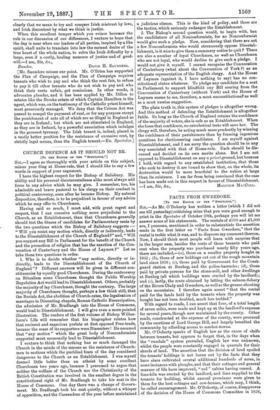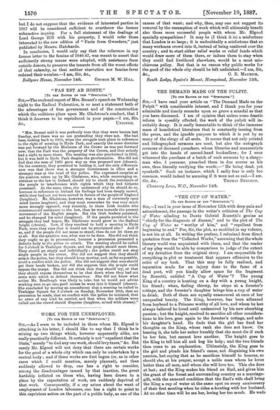FACTS FROM GWEEDORE.
[To THE EDITOR or tax " SPECTATOZ.") Sin,—As Mr. O'Doherty has written a letter (which I did not see till yesterday) criticising mine that you were good enough to print in the Spectator of October 29th, perhaps you will let me answer some of his statements. The rentals of £500 and E1,600 are, I presume, mentioned in order to substantiate the assertion made in the first letter on "Facts from Gweedore," that the rental is treble what it was, and to disprove my comment thereon. Now, I should think most people will learn with surprise that in the larger sum, besides the rents of those tenants who paid rent when the property was purchased nearly fifty years ago, there are included,—(a), those on a smaller property bought in 1862 ; (5), those of new holdings cut out of the rough mountain land since 1838 ; (c). those paid by Government for the Coast- guard station at Bunbeg, and the police-barracks ; (d), those paid by private persons for the stone-mill, and other dwellings at Bunbeg (all which buildings were erected by the landlord); and (e), lastly, the rents obtained by letting the salmon-fishery of the Rivers Clady and Gweedore, as well as the grouse-shooting on the mountains. I therefore again assert " that the rental paid for the lands held by the tenants when the property was bought has not been doubled, much less trebled."
With regard to roads, I can assert that four, of a total length of seven miles, were made and kept up at the landlord's expense for several years, though now maintained by the county. Other roads, constructed at the expense of the county, were procured by the exertions of Lord George Hill, and largely benefited the community by affording access to market-towns.
Mr. O'Doherty speaks of English law as the cause of strife between tenants, but appears to forget that, in the days when the " rundale " system prevailed, English law was unknown, whilst the people were constantly engaged in quarrels for their shreds of land. The assertion that the division of land spoiled the tenants' holdings is not borne out by the facts that they have since cultivated several additional hundreds of acres, in some instances with ploughs, and that their cottages and general manner of life have improved, " sod " cabins having ceased. A lime-kiln was erected by the landlord, and lime supplied to the tenants for building, whilst annual premiums were given to them for the best cottages and cow-houses, which may, I think, be called encouragement. Mr. O'Doherty, of course, disapproves of the decision of the House of Commons Committee in 1858,
but I do not suppose that the evidence of interested parties in 1687 will be considered sufficient to overthrow the former exhaustive inquiry. For a full statement of the dealings of Lord George Hill with his property, I would refer those interested to the new edition of " Facts from Gweedore," just published by Messrs. Hatchards. In conclusion, I would only say that the reference in my former letter to the famine of 1846-47, was meant to assert that sufficiently strong means were adopted, with assistance from outside donors, to preserve the tenants from all the worst effects of that calamity, so that neither starvation nor famine fever reduced their number.—I am, Sir, &c., Ballyare House, November 14th. GEORGE M. W. HILL.
























































 Previous page
Previous page